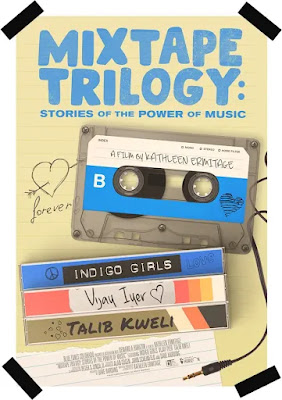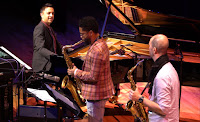Even the biggest names in jazz often play intimate clubs, so jazz fans have an unusually good chance of interacting with their favorites. If you go to up-and-coming musicians’ gigs, you might just make a friend. Some of my favorite musicians are even in-real-life friends with my entire family. It is nice to know this can also happen in other musical genres. To illustrate the point, documentarian Kathleen Ermitage examines the close relationships the Indigo Girls, jazz pianist Vijay Iyer, and rapper Talib Kweli have with special select fans in Mixtape Trilogy: Stories of the Power of Music, which screens during this year’s Cinequest Film & VR Festival.
Sadly, this film could never screen in China, under the current CCP regime. For one thing, Indigo Girls super-fan Dylan Yellowlees identifies the Tiananmen Square Massacre as one of the defining incidents of her late-1980s youth. That would be simple enough to edit out, but the state censors still would never approve Yellowlees’ open and frank discussion of her coming-out-experience, which largely overlapped with that of the band’s. Understandably, it was easy for her to identify with them and she found great meaning in their lyrics. When Yellowlees finally met them while working as a programmer for a local theater, they got on like a house on fire.
Likewise, Iyer found something of a kindred spirit in Garnette Cadogan, a restless academic with adventurous taste in music. Arguably, this is the most personal segment of the film, since their relationship appears to be the closest. Indeed, Iyer often describes Cadogan as a member of his family. Sometimes, Iyer can be counter-productively didactic, but the greatest controversy he and Cadogan address in the film is the criticism the pianist does not sufficiently swing. That is the sort of tired debate that hurts jazz rather than defending it, so Cadogan was right to call it out. (Indeed, Iyer’s Radha, Radha is a rich and rewarding composition.)
The third segment focuses on rapper Kweli and Mike Ford, the self-described “Hip Hop Architect,” but it is the least compelling. Although they have collaborated together, Kweli does not seem to have much to say about Ford on a personal level. Instead, we see a lot of footage of the Hip Hop Architecture Camps Ford runs through his non-profit. He does good work introducing the importance of architecture and its career possibilities to urban school children, but from what we see in the doc, the Hip Hop aspects seem rather forced, like using rap lyrics to determine how many floors a building should have. Whatever happened to “form follows function?”
Indeed, musical diversity is really the only form of diversity of thought Mixtape features. It would have been a nice contrast to also watch a conservative country artist who might have formed a special friendship with a military veteran fan (there must be a case like that out there). Still, it is nice to see the film encourage the dialogue between artists and fans. It is always good to know your music is connecting, which is why the pandemic epilogue is so sad. Both fans and musicians lost out on so much during that time. Recommended for fans of the featured artists, especially the Iyer segment, Mixtape Trilogy screens tonight (8/21) and Thursday (8/25) as part of this year’s Cinequest.

